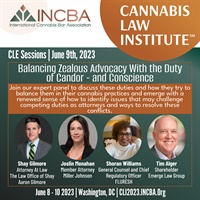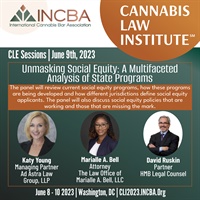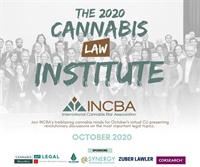
- Average Rating:
- 2
- Bundle(s):
- Global Cannabis IP Symposium 2023 On-Demand Bundle
- Categories:
- Intellectual Property | IP law | Administrative Law | Ethics | Specialty Credits
- Faculty:
- Hannah Stitt | Rachael Dickson | Arturo Revilla | Jeffrey Merk
- Duration:
- 1 Hour 2 Minutes
- Format:
- Audio and Video
- SKU:
- INCBA092923ethicsOD
- License:
- Access for 6 month(s) after purchase.
- Short Description:
- Global Cannabis Intellectual Property Symposium 2023 session: Ethics: Balancing Activism and Zealous Advocacy with the Boundaries of the Profession and Evolving Law
- Price:
- $30.00 - $75.00

- Average Rating:
- Not yet rated
- Bundle(s):
- CLI2023 On-Demand
- Categories:
- Ethics | Mindfullness | Specialty Credits
- Faculty:
- Joslin E. Monahan | Shoran Williams | Timothy L. Alger | Mr. Shay Aaron Gilmore
- Duration:
- 1 Hour 9 Minutes
- Format:
- Audio and Video
- SKU:
- INCBA072023candorOD
- License:
- Access for 6 month(s) after purchase.
- Short Description:
- As the cannabis industry grows and more states allow cannabis licensing, the ethical duties that cannabis attorneys must balance have grown more complicated. These ethical duties require lawyers to balance and re-evaluate their duty to zealously advocate for their clients with the duty of candor, their duties to all of their cannabis clients – and, at times, their belief systems and why they entered cannabis law originally. Join our expert panel to discuss these duties and how they try to balance them in their cannabis practices and emerge with a renewed sense of how to identify issues that may challenge competing duties as attorneys and ways to resolve these conflicts.
- Price:
- $30.00 - $75.00

- Average Rating:
- Not yet rated
- Bundle(s):
- CLI2023 On-Demand
- Categories:
- Social Equity | Specialty Credits
- Faculty:
- Marialle A. Bell | David Ruskin | Katy Young
- Duration:
- 1 Hour 4 Minutes
- Format:
- Audio and Video
- SKU:
- INCBA072023unmaskingOD
- License:
- Access for 6 month(s) after purchase.
- Short Description:
- In this course, attendees will examine the interconnectedness of social equity initiatives and basic legal principles (i.e. justice, equity, etc.) This program will encourage diversity of thought, give cannabis attorneys more to consider when advising diverse populations and ask participants to walk a mile in a social equity applicant's shoes. Attendees will leave this course with a deeper understanding (and appreciation) of why social equity programs exist, including their role in undoing the harms of cannabis prohibition, how they serve diverse clients and promote equal access to justice, and why social equity programs are necessary.
- Price:
- $30.00 - $75.00
- Average Rating:
- 4
- Categories:
- Specialty Credits | Ethics | Substance Abuse | Mindfullness | Ca. Competency Credit
- Faculty:
- Richard Carlton | Jeena Cho
- Duration:
- 57 Minutes
- Format:
- Audio and Video
- SKU:
- INCBA102720MIOD
- License:
- Access for 6 month(s) after purchase.
- Short Description:
- Jeena Cho will cover resilience, work/life integration, and wellness in the workplace. Her area of expertise includes women’s issues, diversity, wellness, productivity, mindfulness, and meditation. Richard Carlton will be covering substance abuse and depression disorders. He will dive into the relation between practicing law and the mentality necessary to "succeed" at practicing law.
- Price:
- $30.00 - $75.00
- Average Rating:
- 4
- Categories:
- Specialty Credits | Ethics | Substance Abuse | Mindfullness
- Faculty:
- Hannah Stitt | Patrick Nightingale | Bob Nichols | Andrew Kingsdale
- Duration:
- 1 Hour 10 Minutes
- Format:
- Audio and Video
- SKU:
- INCBA102720THOD
- License:
- Access for 6 month(s) after purchase.
- Short Description:
- Panelists will discuss how cannabis use and substance abuse issues can interfere with an attorney’s competence obligations, and mandatory reporting requirements.
- Price:
- $30.00 - $75.00
- Average Rating:
- 4
- Categories:
- Specialty Credits | Ethics | Substance Abuse | Mindfullness | Ca. Competency Credit
- Faculty:
- David Mann
- Duration:
- 1 Hour 8 Minutes
- Format:
- Audio and Video
- SKU:
- INCBA102720SUOD
- License:
- Access for 6 month(s) after purchase.
- Short Description:
- Of all white collar professionals in the United States, alcoholism and depression are most common among lawyers. And we serve an industry that makes an intoxicant more widely available than it has ever historically been. So, what does that mean for our own mental health and our own battles with substance abuse.
- Price:
- $30.00 - $75.00

Product Type

